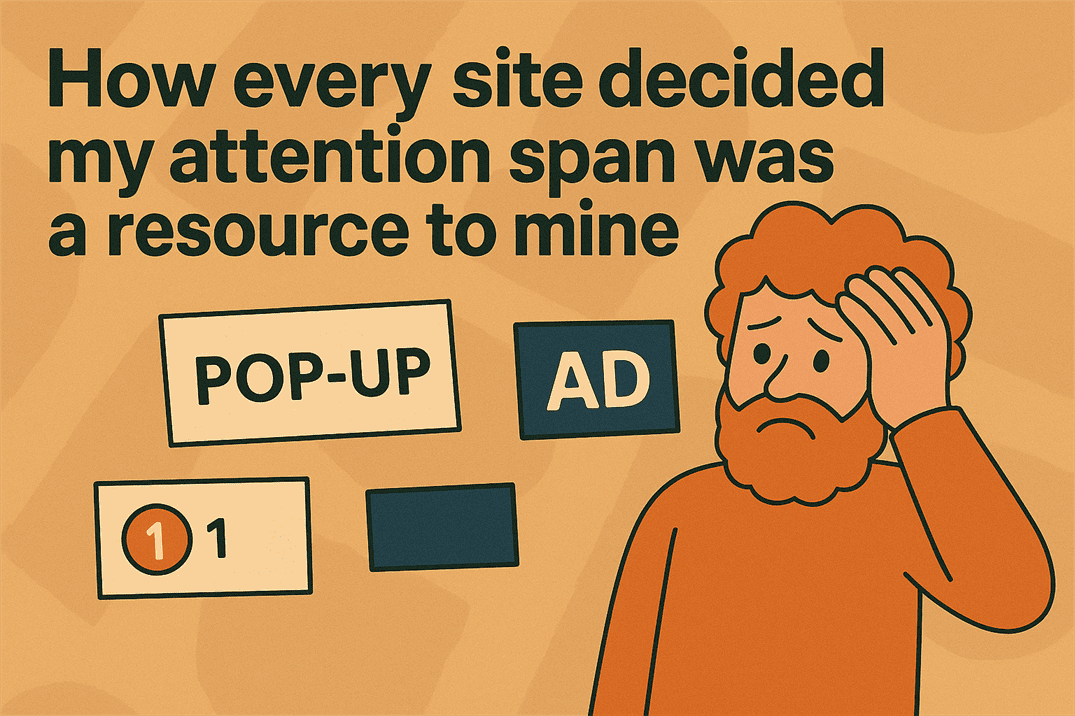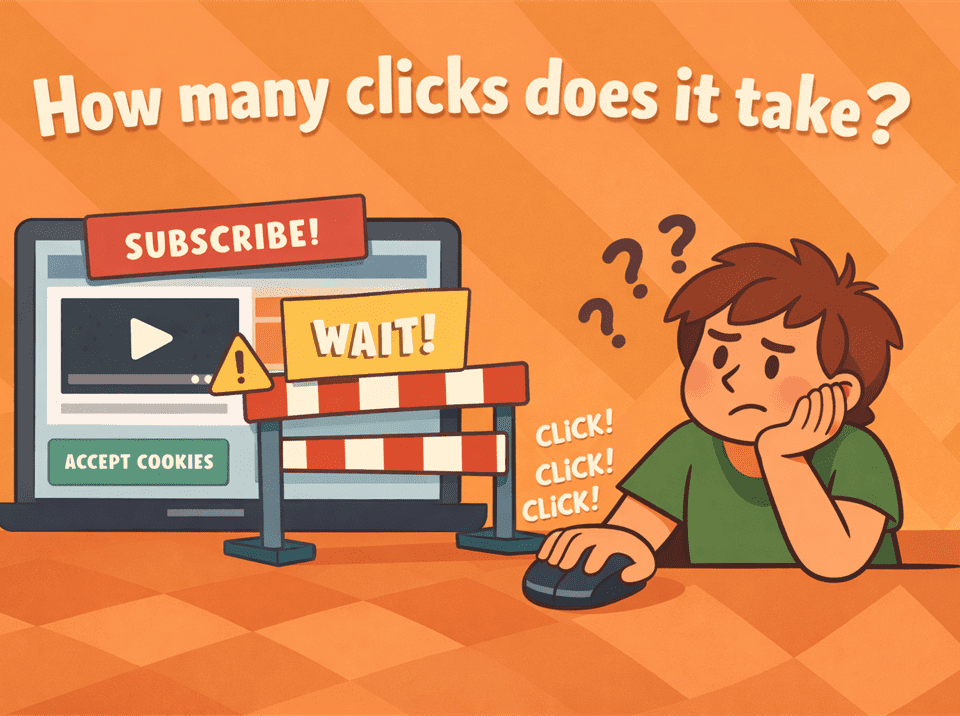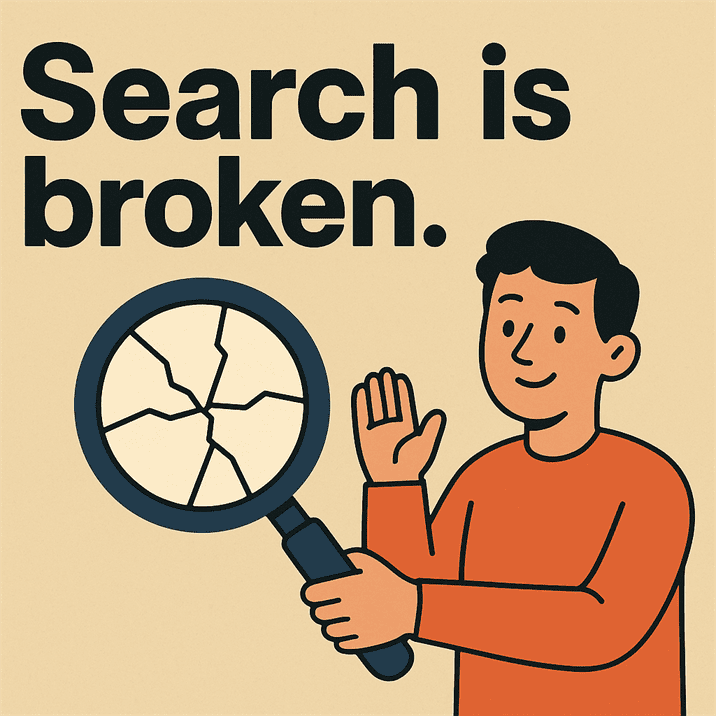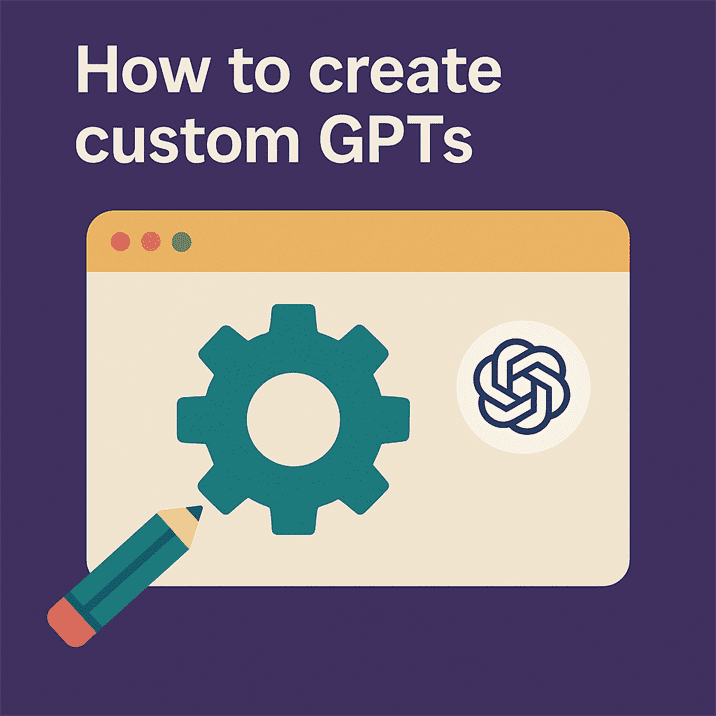How every site decided my attention span was a resource to mine

I don’t remember exactly when websites stopped being places to visit and started being clingy exes.
Maybe around the time “cookie consent” became code for “we’ve already sold your data, but would you like to feel involved?”
Now, every page greets me like an overenthusiastic charity street collector.
“Hey! Hey! Can we notify you about updates?”
No.
“How about a newsletter?”
No.
“Care to take a survey?”
Still no.
“Would you like 10% off if you give us your soul, postcode and three preferred shoe sizes?”
Absolutely not but thank you for the offer.
And somewhere behind all this, the article I came to read is quietly sobbing in a corner, whispering “I’m still here.”
The great pop-up parade
Popups used to have purpose. They were digital versions of a helpful store clerk: “Need help finding something?”
Now they’re more like an overzealous car salesperson who sprints toward you the second you park.
You know the type: the “Wait! Don’t go!” exit intent popup, the “Welcome back, [NAME]!” even though you’ve never been there before.
And my personal nemesis, the full-screen email gate that loads one nanosecond before the text does.
It’s like websites collectively decided, If they won’t read our content, they’ll at least read our interruptions.
Push notifications: the digital mosquito
Let’s talk about browser notifications. Once upon a time, I clicked “Allow” on a news site because I thought, Sure, I’d like breaking updates about the world.
Cut to three weeks later and my laptop sounds like a slot machine during happy hour.
Ping! Sports results you don’t care about.
Ping! Celebrity you’ve never heard of did something mildly interesting.
Ping! Reminder that you still exist, apparently.
Somewhere, there’s a notification manager laughing, polishing their “engagement” metrics and whispering, “Another satisfied user.”
The autoplay apocalypse
Remember when video was something you chose to play? Yeah, me neither.
Now, I open a tab and 0.3 seconds later I’m blasted with stock music and a stranger saying “Welcome back!” to my startled face.
Autoplay is the UX equivalent of someone bursting into your living room with a leaf blower shouting “Do you have a minute for our sponsor?”
And yes, I could mute the tab. I could also wear noise-cancelling headphones, move to the woods and read only printed material from 1987.
None of which are sustainable solutions, given I run a digital content business and, regrettably, like the internet.
Attention is the new oil (apparently)
Somewhere, some bright-eyed marketer looked at a chart and said, “People are leaving our site too soon! Let’s make it impossible to leave!”
And everyone nodded like this was brilliant.
This was the moment the internet collectively forgot the difference between attention and affection.
Because, the harder a site tries to hold my attention, the faster I leave.
My brain treats aggressive popups the way a cat treats a cucumber, fight or flight, usually both.
What no one seems to grasp is that genuine engagement isn’t something you can wring out of people.
You can’t ambush someone into caring.
Confession: I’ve done it too
Here’s the awkward part. I’ve been on the other side.
I’ve written those cheery popup headlines. I’ve suggested “a friendly newsletter overlay” during team meetings.
I once used the phrase “intent-based opt-in” with a straight face.
And I meant well. Everyone in marketing does. We’re not villains; we’re just standing knee-deep in analytics dashboards, chasing click-through rates like it’s the Hunger Games.
But when I look at my own browsing habits, I realise I skip through half the noise I create.
Which raises an uncomfortable truth, maybe we’ve mistaken friction for strategy.
What I wish more sites did
I don’t want fewer options. I want quieter ones.
Ask once, politely. Don’t flash, slide, or bounce. Let the content do its job before the coupons show up.
Think of it like a dinner party. You don’t shove the dessert trolley in someone’s face during the starter. You wait until they’ve had a taste of what you’re serving.
The best websites are confident hosts. They trust you’ll stay if you’re comfortable and leave if you’re not.
That’s how respect works, online or off.
In conclusion (before a popup interrupts me)
If websites could hear me, I’d say, I love you. I really do. You’ve made life easier, funnier, occasionally profitable.
But you’ve also started acting like toddlers armed with push notifications.
You don’t need to fight for my attention. You just need to deserve it.
And yes, I know, you probably had to tackle a cookie popup just to read this post. That one’s about the law, not common sense.
Would you like to be notified when I publish another piece about why websites are slowly becoming Times Square with worse lighting?
Kidding. Mostly.
If you want web content that deserves attention, come say hi.



